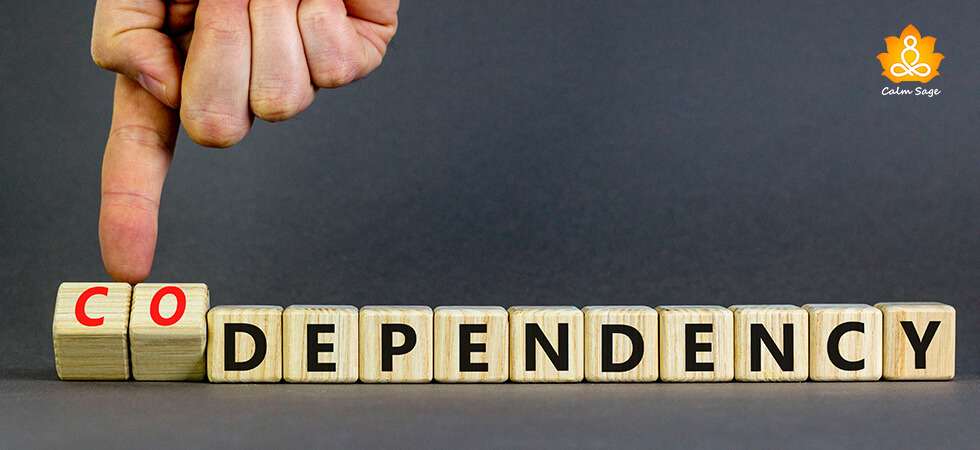10+ Codependent Traits That You Need To Know About

Are you everybody’s go-to person? Does being there for everyone else make you put off meeting your needs? It could be a codependent trait of yours. Think about the last time you did something for your needs or desires. Just something that you did for yourself without thinking about your partner, friends, or parents.
Even though you’ve been exhausted and fatigued, you have taken time out of your schedule to care for your loved ones’ needs more than yours. More than anything, you want some time and space for yourself and it’s natural to want so too when you’re living a busy life.
But, is it just a response to busyness, or is it a consequence of codependency?
Let’s take a closer look at some of the most common codependency traits, how it affects your actions, what they feel like, and what you can do to cope with the traits of codependency.
What Do We Mean By Codependency?
Gaining quite a popularity in our daily vocabulary, codependency is, more or less, a buzzword that refers to the behavioral pattern where one suppresses their needs to meet others’ needs. This term was previously used for relationships where one partner would be living with substance use or alcohol use disorder, but these days, this term can be used in all relationships.
Codependent behavior can be commonly found in relationships where one or more people are struggling with mental health disorders, generational trauma, or other disorders. While it is not a formal diagnosis, codependency can be used to describe different relational styles and issues.
Psychologists define codependency as compassion turned into a compulsion to care for loved ones. Codependency might make you feel that you’re giving up your desires and needs to keep others happy and satisfied.
Could It Be More Than People-Pleasing?
While codependency might look like people-pleasing, it goes beyond that. Here, codependent people can be people-pleasers but not all people-pleasers are supposed to be codependent. Codependency traits go beyond people-pleasing. If you’re codependent, then the person whose needs you’re fulfilling is dependent on you too.
Here’s another example; if you grew up in a traumatic household, then you might not have had the freedom to be you without being codependent. This, eventually, resulted in you developing an anxious attachment style, where you put the needs of others before yourself to protect yourself and avoid being rejected, neglected, or abandoned.
What Does Codependency Look Like?
When you’re struggling with codependency or codependency traits, there could be moments when you feel wonderful when caring for a loved one.
But it could also look a lot like fear because you’re alone when taking care of another person’s needs. You may also feel mixed emotions such as;
- Anxiety
- Exhaustion
- Fatigued
- Insecure
- Out of control
- Overwhelmed
- Anger
- Taken for granted, and
- Lost
Codependency, more often than not, results in feelings of anxiety and depression because your needs are essentially neglected.
Codependency Traits To Know!
Codependency is a set of behavioral patterns that can be associated with personality traits. Here are some common codependency traits you need to know about;
Cognitive Traits
● Difficulty sorting through your opinions and others’
● Difficulty identifying and expressing your desires
● Taking others’ needs as your own
Behavioral Traits
● Taking more responsibilities than you can handle
● Doing things for others because you fear rejection or being abandoned
● Staying in toxic or unhealthy relationships to avoid being alone
● Getting mixed up in others’ businesses
● Pushing yourself beyond your limits for others
● Not setting boundaries with others
● Fixing others’ problems or issues even if you’re not asked to
● Seeking external validation and approval from others
Emotional Traits
● Not being able to say “NO” to others
● Fear of not being accepted or validated by others
● Feelings of inadequacy
● Having low self-esteem
Signs Of Codependency
Let’s take a look at the signs of codependency in different relationships in your life;
In Family Relationships
● Being available for everyone anytime
● Helping family members with their chores
● Giving financial support even if you need it more
● Dropping your responsibilities to take care of a toxic or hostile parent(s)
In Romantic Relationships
● Changing your schedule or routine to suit your partner’s needs
● Skipping sleep or meals to accommodate your partners’ routine
● Making excuses for your partner’s behavior when they were intoxicated
● Wanting to be seen as a savior by your partner
In Work Relationships
● Saying “YES” to every task sent your way
● Doing favors for your coworkers even when you’re overworked
● Regularly assisting on group projects even if it’s not your responsibility
Please keep in mind that codependency can also overlap behavioral signs and symptoms of other mental health disorders such as;
● Dependent personality disorder
● Borderline personality disorder
● Histrionic personality disorder
● Post-traumatic stress disorder (PTSD)
● Complex PTSD or C-PTSD
How To Cope With Codependent Traits?
Even though codependency isn’t an official diagnosis, you can reach out to a mental health professional to identify the causes of your behavioral patterns. They can help you figure out what’s causing your signs of codependency. For example, traumatic childhood.
In any case, cognitive-behavioral therapy or CBT can be a great starting point to help you identify your negative behavioral patterns and reframe them into positive ones. A CBT therapist can also help you find healthy coping tools and resources to cope with co-occurring conditions such as anxiety and depression.
You can also try some self-help strategies to deal with codependency traits. You can start by journaling, somatic therapy, or just focusing on your hobbies, interests, goals, or passions for once.
Final Thoughts…
With the right help and support – either from a professional or loved one – you can learn to overcome your codependency traits and behaviors. Just remember, your codependency traits do not define your personality but just a fraction of it. With the right tools, you can learn to separate yourself and your needs from those around you.
I hope this article helped you. For more, you can write to us at info@calmsage.com or DM us on social media. You can also share your thoughts with us in the comments below.
Take Care!




















